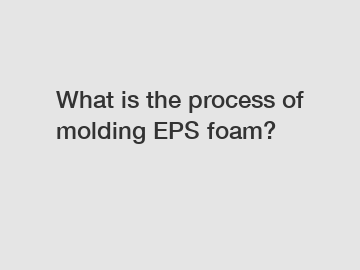What is the process of molding EPS foam?
What is the process of molding EPS foam?
If you've ever wondered how those lightweight packaging materials or insulation products are made, the answer lies in the process of molding Expanded Polystyrene (EPS) foam. EPS foam, also known as Styrofoam, is a versatile and widely used material due to its excellent insulation properties, lightweight nature, and low cost. In this article, we will explore the detailed process of molding EPS foam and its various applications.
1. Pre-expansion:

The first step in the process involves pre-expanding the polystyrene beads. These beads are fed into a pre-expander machine that uses steam to heat and expand them. The expansion occurs when the blown steam enters the chamber, causing the beads to increase in size by up to 50 times. This pre-expansion removes any moisture trapped in the beads and makes them ready for the molding process.
2. Conditioning:
After the pre-expansion phase, the expanded beads are further conditioned to attain the desired density and particle size. They are passed through a drying stage, where they lose moisture and become more uniform in size and shape. This helps ensure consistent molding results and enhances the mechanical properties of the EPS foam.
3. Molding process:
Once the beads are properly conditioned, they are ready to be molded into the desired shape. There are two common methods for molding EPS foam: block molding and shape molding.
- Block Molding:
In block molding, the expanded beads are poured into a preheated mold, which has the shape of a large block. Steam is injected into the mold, causing the beads to rapidly fuse together and expand to fill the entire mold cavity. As the steam acts on the beads, it molds the foam into the desired shape. After a short curing period, the newly formed block of EPS foam is cooled and removed from the mold.
- Shape Molding:
Shape molding is a process used to create more intricate shapes and designs. It involves the use of two molds: one for the exterior shape and another for the interior shape. The pre-expanded beads are poured into a shape mold, and steam is injected to ensure that the beads fuse together and conform to the mold's contours. This method allows for the production of items like protective packaging, coolers, insulation panels, and even decorative designs. Once the foam has cured and solidified, the finished product is removed from the mold.
4. Additional processing:
After the initial molding process, the EPS foam can undergo additional processing steps to enhance its properties. Some common secondary processes include hot wire cutting, lamination, and coating. Hot wire cutting is used to shape and trim the foam into specific dimensions, while lamination involves bonding EPS sheets together to create thicker panels. Coating, on the other hand, provides a protective layer or adds aesthetical finishes to the foam.
EPS foam's versatility extends to various applications. Its lightweight nature and excellent insulation properties make it an ideal choice for packaging fragile items like electronics, appliances, and even fruit. In the construction industry, EPS foam is widely used for insulation in buildings, as it significantly reduces energy consumption and effectively regulates temperatures. Additionally, EPS foam is utilized in the automotive industry for interior components, in the marine industry for buoyancy aids, and in the arts and crafts sector for sculpture creation.
In conclusion, the molding process of EPS foam involves pre-expansion, conditioning, and then the actual molding using either block molding or shape molding techniques. The ability to shape EPS foam into various forms allows for its widespread use in packaging, construction, automotive, and other industries. Now that we've explored the process behind molding EPS foam, we can better appreciate its numerous applications and the crucial role it plays in various sectors.
For more information, please visit EPS foam moulding machine price, Automatic Extrusion Blow Molding Machine, PE Foam Extruder.


